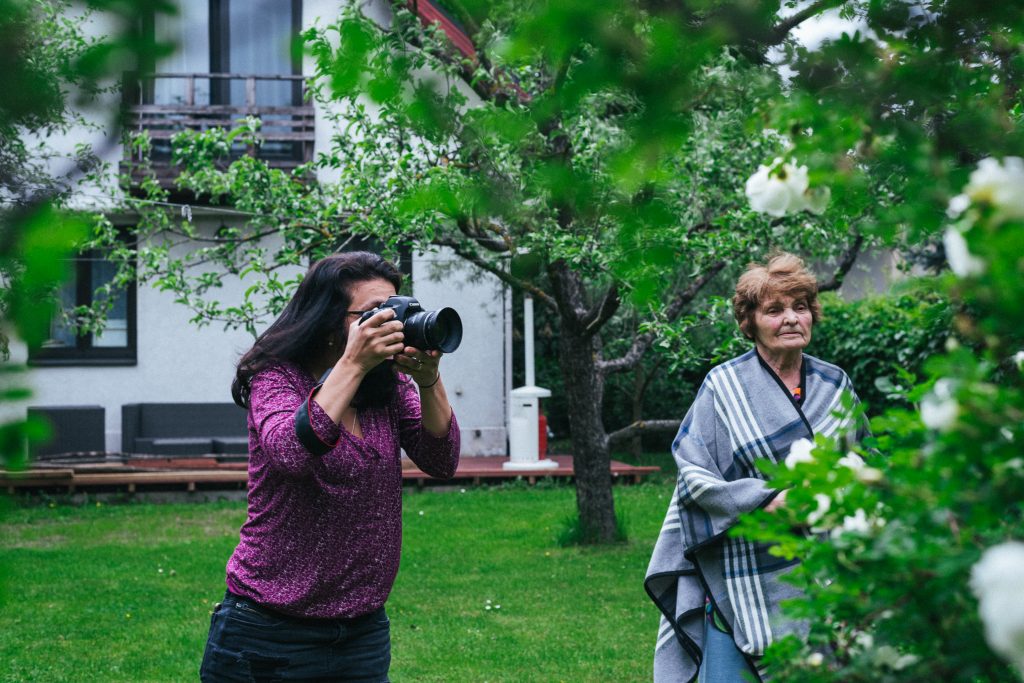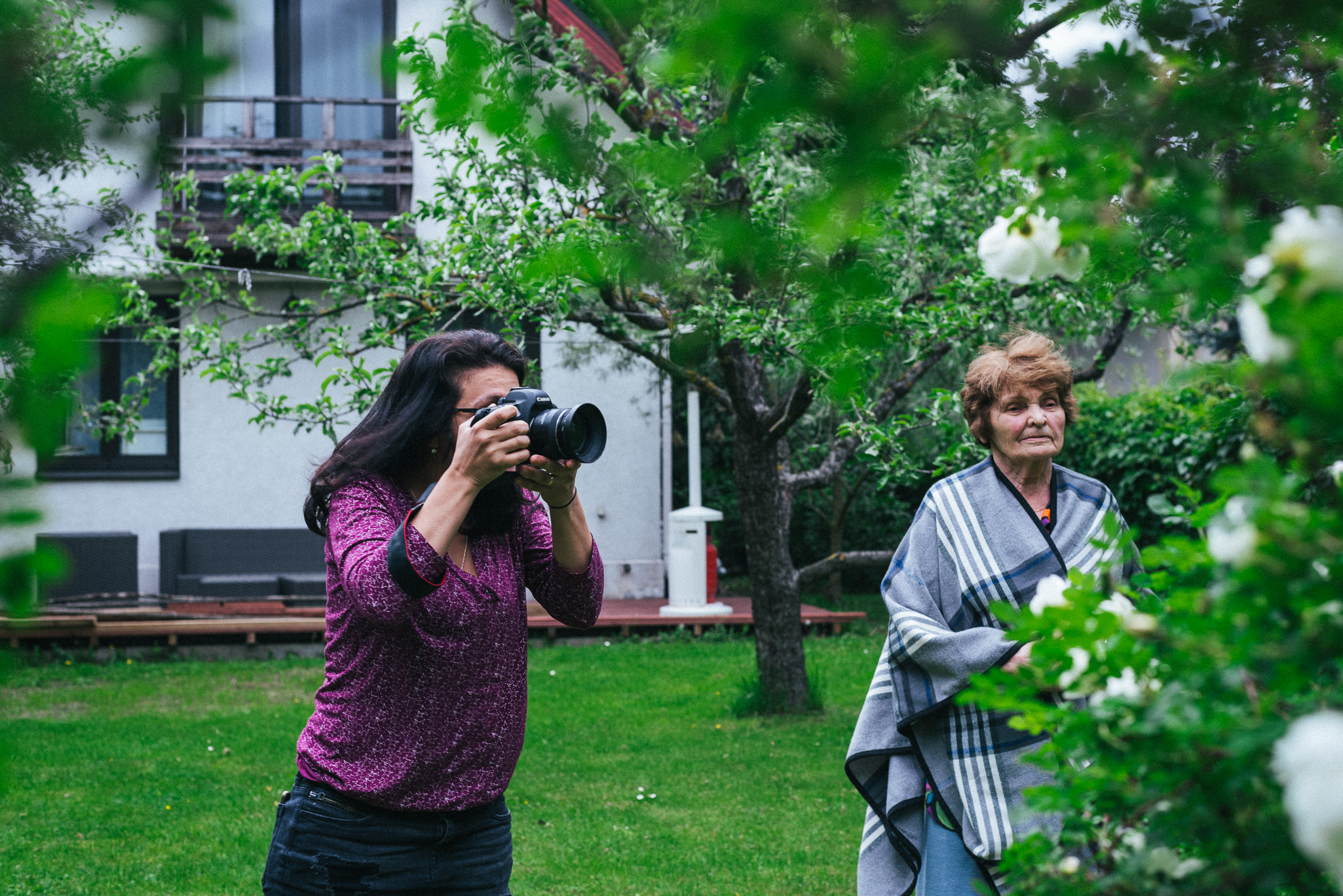Odeta Catana, a Romanian Berlin-based documentary photographer whose MagiC Carpets residency brought her to Riga and into the hands of the New Theatre Institute of Latvia. While here, she joined the creative team of the ‘almost documentary’ performance “A Country of Grandmas”, to share her knowledge and experience and create a documentary photo story about the aging, the role of grandmothers in the 21stcentury, the relationship between seniors and young people. The result of the residency was shown on June 29 at the festival “Lampa” in Cēsis. In this interview with Nanook journalist and fellow photographer Berta Tilmantaitė, she tells more about her practice and what she discovered throughout her projects and working here in Riga.
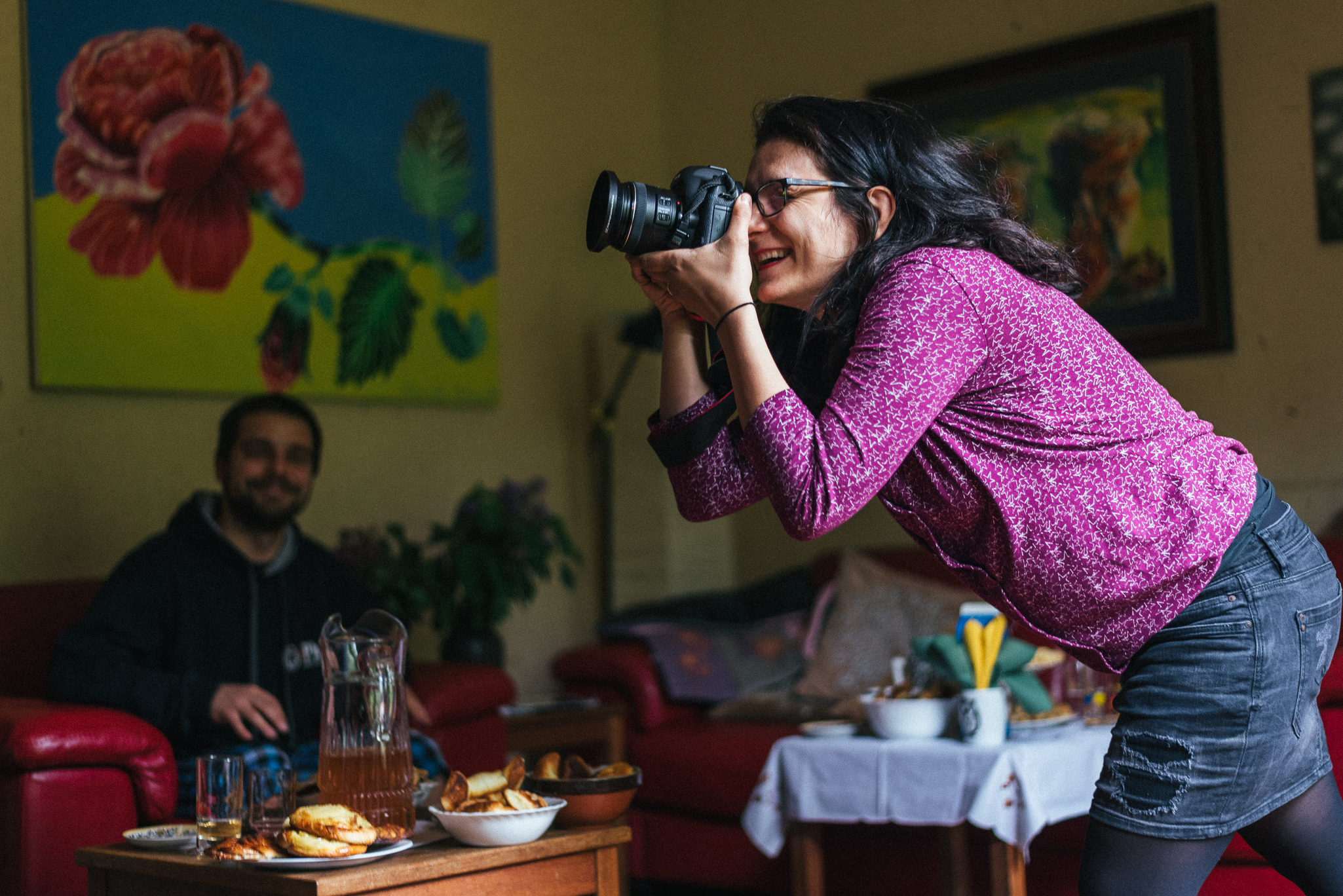
Odeta: My name is Odeta Katana, I am Romanian, but I have been living in Berlin (Germany) for six years now. I left Romania a while ago, eight years, to be more precise. I also studied documentary photography 8 years ago. This is how I left Romania and this have been my profession ever since. But yes, my documentary projects sometimes bring me back to Romania, so they are more or less related to my home country. I am here, in Riga, for this project with Kvadrifons and with MagiC Carpets. These are some of my last days here, taking photos and recording the project and then I will return in June for the performance. To be here, for the rehearsals and exhibitions and so on.
Berta: Can you tell about the project that you do here, how it is called, how did you come up with the idea?
Odeta: So, yes, the project, a performance we have had, is developed here in Riga. It is called “Grandmother’s Land” or “Country” (the title is yet to be confirmed). And yes, I was asked to come and do the documentary photography for this project. There is this group of actors and artists in Riga (Latvia) called Kvadrifons and they have come up with the idea of this project, in which they speak about their experience of being raised by their grandmothers.
First of all, each of them have interviewed their own grandmothers. Afterwards, they put all these interviews together, and they wrote a screenplay with the help of some screenwriters. And yes, my work has been to come afterwards (which means now), and to photograph all these grandmothers who are still alive. I think I have taken photos of 3 of them. This project is still in progress, so I am not sure. These photos will be eventually exhibited, as the final stage of the performance. I haven’t read the script which was written and which will be performed yet, but from what I have been told, it will be very abstract, somehow it’s surreal and somehow these photos, which are pure documentary, will come into play, the creators will use them for balance, but only at the end, when people will be coming out of the play.
Berta: Can you describe the work process and how do you fell about it?
Odeta: First of all, I have to admit it’s my second experience like this in which I find myself facing a language barrier as I don’t speak either Russian or Latvian and then all my projects so far have been in a language that I am fluent in or at least I understand. So every time, each visit to a grandmother, is done through Sandra, the curator from Riga, and she is actually making the introductory part, the convincing part to the grandmothers who are very shy. In my previous projects, I was used to do this part – convincing, making all of this experience softer, lighter. So without Sandra, the curator, it wouldn’t actually be possible, because all the grandmothers are very shy, camera-shy, or they don’t know what to expect, they are nervous before our arrival and so on.
And of course, it’s complicated to translate everything along the way. I just wait, I look for the signal that they are more or less convinced whether it’s ok to be photographed, and I just ask at the very end or whether I need to know something which I need to photograph, I mean a detail or so. I ask about it, but other than that, I don’t want the translation immediately, so I let Sandra do all the talking. And the experience itself is very interesting, because at the end, I have found all these grandmothers and actors very kind. I find them very gentle and sweet. Even though they appear rough at first, after 10 minutes for some and 5 minutes for others, they melt down. So yes, I find it very interesting to see this as an observer, because I am observing more or less this convincing part, through photography as well and I find it very interesting.
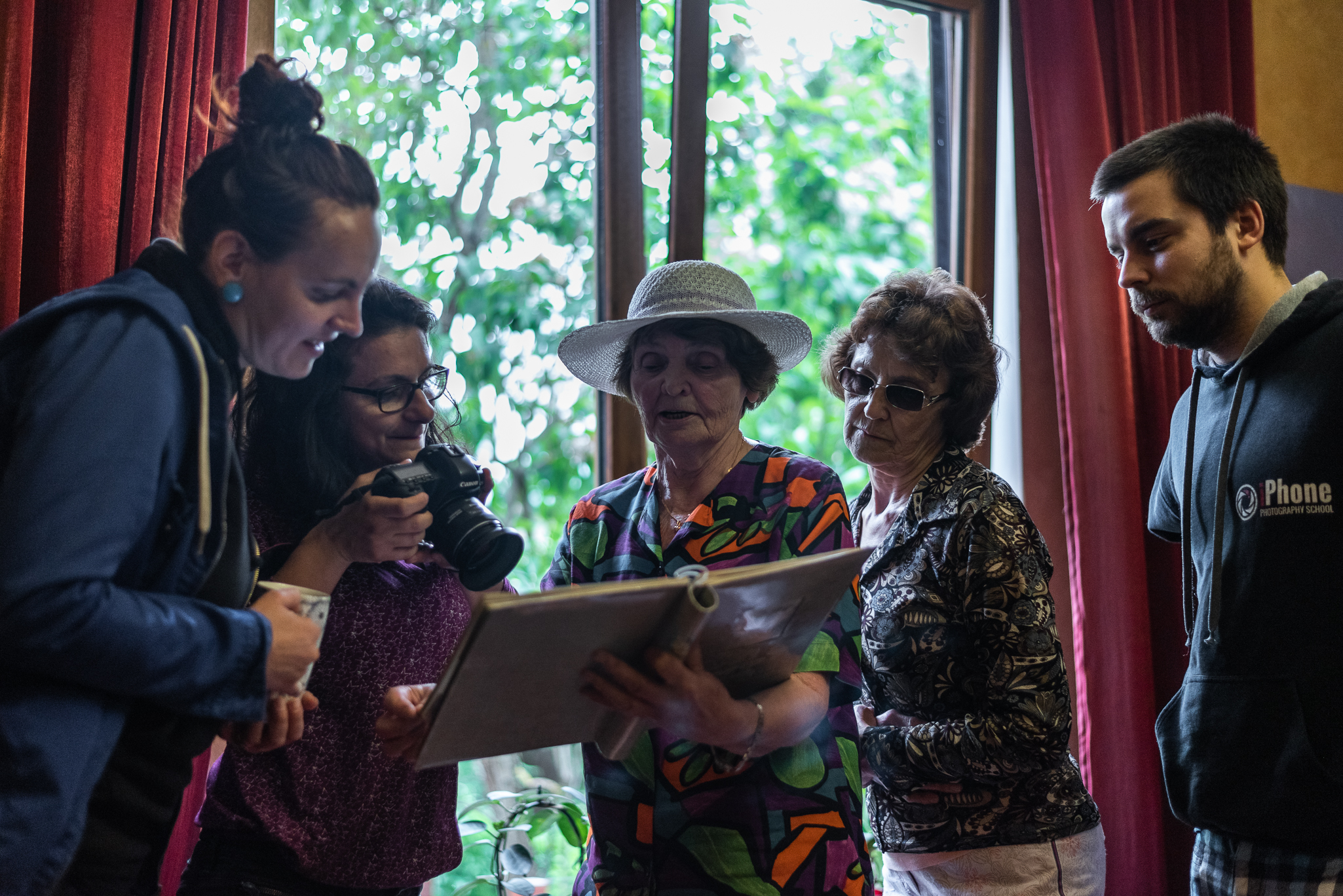
Berta: What’s the main idea of the work that you do, what do you want to communicate, what’s the message?
Odeta: As far as it concerns me, I have not read the script so far, only been given the idea, I am more or less free to do whatever I want. So when it comes to the grandmothers, I want a big portrait with them. And then around them, like the Sun with the planets. I also want small details from their home to compose the image and reflect the personality of the grandmothers. And even though the exhibition is at the end of the project, I want to have these big portraits of grandmothers which looks directly into the camera. They are very dedicated, when they know they are photographed. They understand that they are photographed, and then those details are in different sizes. The viewer who comes to the exhibition in order to see those small details, they need to approach the photograph, but then they also need to see the big picture, to take a step back in order to see it. I imagine the portrait, a big portrait, about 1 meter in height or a bit smaller, with all these details, bigger or smaller, and I want to play a bit with the distances, so they need to go back and forth towards the photos to feel the personality. This is the idea more or less.
Berta: So the idea is to show the personalities of the grandmothers?
Odeta: Yes, this is what they have said and what they wanted to convey. I mean through the interview with the grandchildren, and also including what I have seen around the houses and not something necessarily in words, but more in images: what is really around them now, in 2019, when they are 80, 70.
Berta: And you also have photographed the grandchildren together with grandmothers?
Odeta: Yes, at one point, I have come up with this idea, but actually I think it was on my arrival here exactly. In my previous projects, I always want to give something in return, I find it very selfish, if I, as a photographer, go in people’s houses, and not give something in return, just steal away the image and then what do they have? Nothing. And what could be a bigger gift for a grandmother than to have a picture with her grandchildren now when the project is done. So, the idea behind this photo, which I don’t think will appear in the exhibition, is that the picture will be printed and framed and given as a gift to the grandmothers after my departure from Riga, by the curator Sandra, posted or given to actors, so the actors can give it to grandmothers.
Berta: How do you find work with Sandra, the curator?
Odeta: We are still in the process of getting to know each other, because we have not known each other when I arrived, only had one Skype conversation and maybe 20 emails concerning logistics. We also had to travel to each grandmother, because of the language barrier. So we drive a long way, and speak about things, she gives me inputs about Latvia, about Riga, culture, and I ask things about what I see around in Riga, or if we travel outside Riga, so she helps me very much to understand as much as she knows and understands herself. She is an insider and, of course, and I can Google things, if I want and I do it, but still it is nice to know a local person and the curator’s opinion about culture and about grandmothers in general: how she sees it and what is the cultural environment in Riga.
And the artists are also amazing, knowing each other in their small group, and it is very amazing that they share the same ideas and opinions about the fact that they really want to do this project for Latvia and they stick to this city, this country. I find it very encouraging for Latvia and very beautiful that so many people, young people, are here to make so alive culture-wise. I find Sandra like one of these people, because she does not want to leave Latvia, just to make the difference here as well, and to be part of this generation’s experience. Maybe the project is about it as well: we start from the old generation that has raised these actors, has been part of their education, growing up, and now they are seen and so active in the cultural cinema, in the cultural scene of Riga, and we know what is their background. But Sandra is very helpful in all this process and I find her to be a very interesting person to speak with. She has provided very good insights about Latvia and Riga for me.
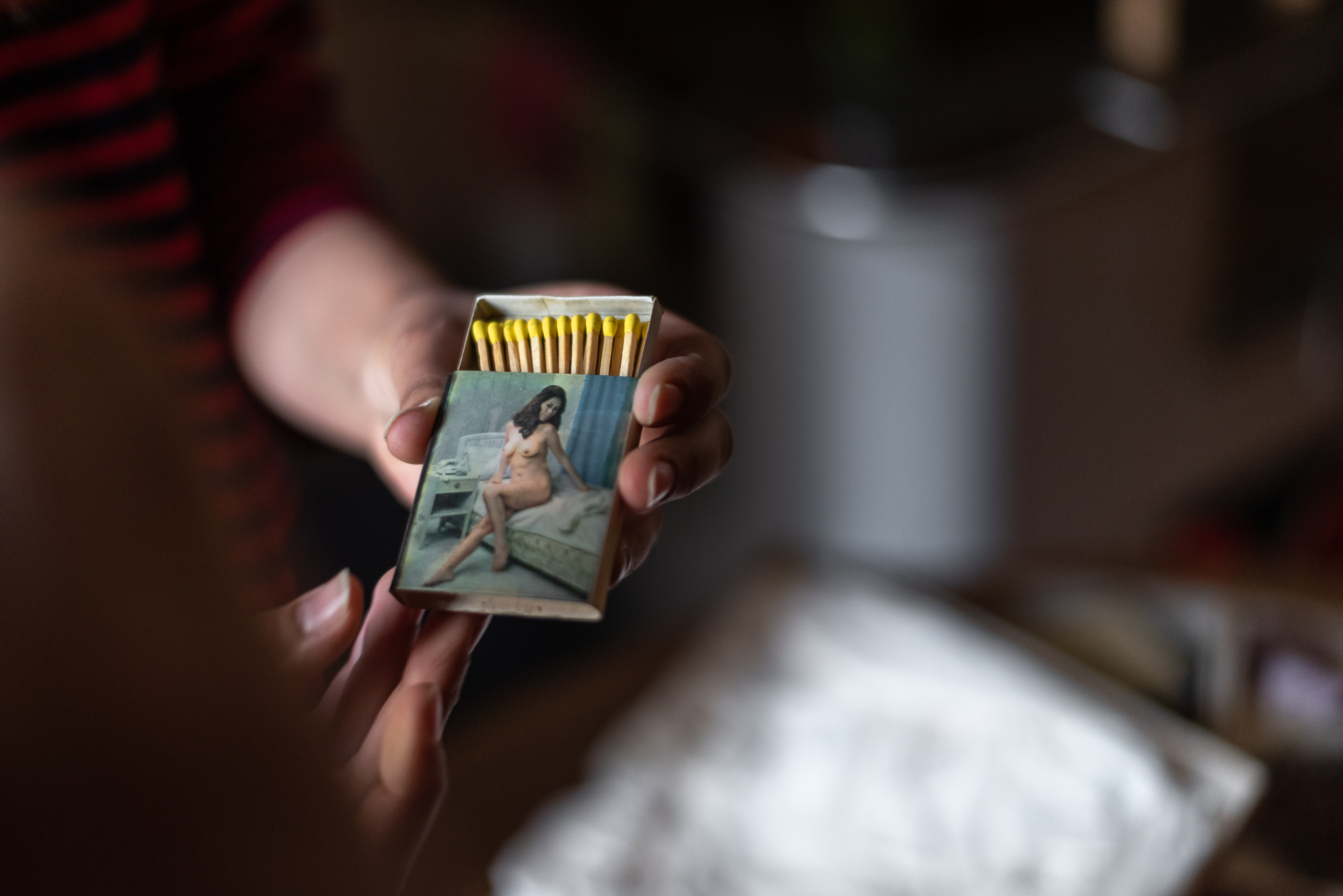
Berta: While you live in Berlin, and you are originally from Romania, how do you find this environment and people here? What do you like about it or what is different, what is interesting?
Odeta: I would not know what to tell about grandmothers in Germany. I have to admit. I haven’t done a project about grandmothers or the older generation in Germany so far, but I have done this in Romania, and as I have said, here I find them to be rougher, stronger, with a lot of barriers. I am an outsider, and sometimes I remain in the garden to photograph them, only in the garden, and some of them actually let me inside the house, but only in some rooms they wish to be photographed, or they wish me to see.
While in Romania, it was different. For example, when I was shooting in my hometown, they would really show me the entire house. It was my hometown, my grandmother was a friend with all those elder people, so it was in a way a matter of networking. And what I find here, actors and grandchildren are so gentle to their grandmothers, they don’t want to force them to be photographed, they are still acting like small children, they want to respect their grandmothers, and they do not go against their wishes, which I find totally beautiful. It is something that I really admire. Sandra and me where the ones who were pushing to take photos while they were not saying one word. I was pitching ideas: let’s photograph the cat in the house just to make it inside, and the actors found it a good idea, as the grandmothers accepted it. But in the end, this grandmother simply brought the cat outside in the garden. This is more or less what happened until now.
Berta: How many portraits are you going to do, and how many grandmothers are you going to meet?
Odeta: I am not sure, I think there were 9 or 8 actors, and I think 3 of the grandmothers are no longer with us, so 6. Sometimes the actor invites both grandmothers, at the end there might be 7 or 8 of them.
Berta: How do you find this whole MagiC Carpets project experience? The whole residency, the possibility to come over here and to do this? Has everything worked out well, are you able to do what you want to do and what you usually do?
Odeta: Totally. It is what I needed, and it was made so accommodating and easy, participating in this photo project, photo sessions come together, but also my stay here brought understanding what is going on, I mean in the cultural scene in Riga, as I have said. Riga Photomonth has started last week, so it was a good coincidence and a chance to look at what is going on in photography as well.
Everyone was so understanding, especially because I am still on my maternity leave, and I have a child who is 1 year old, and from the very beginning, in February, when I has been invited to come for this residency, I have told Sandra that I am not doing this without my daughter Erica, that I am not sacrificing my child for any residency and that I cannot do it without being together with my daughter.
So I am happy I could do it, because I have never been to this country, to this city and a perfect way to see a new place for me is through photographing. I am not such a touristic person that needs to visit one country per year, a new country, so I feel enriched. It is perfect, if it is through photography, and because it was also with Erica, I find this moment in my life magic. The name of MagiC Carpets is so fitting, because I have found it magical that I have been accepted with my daughter Erica to do this project. With my husband as well, because while I am working, he is there with Erica. When I am not working, he is working from home and I can go around the city and see exhibitions and things to be seen here in Riga. So yes, it’s all three of us here, so we can each manage this situation and to experience Riga and Latvia. And I am happy about this. We have had a few days of hot weather and we went to the Gulf of Riga, to Jūrmala and I took pictures of Erica as well and it will be funny to tell her after 10 years: look you’ve been to Riga, when you were 1. I find this very sweet and again it’s very considerate of MagiC Carpets and also of the curator Sandra that she immediately acknowledged and accommodated by situation.
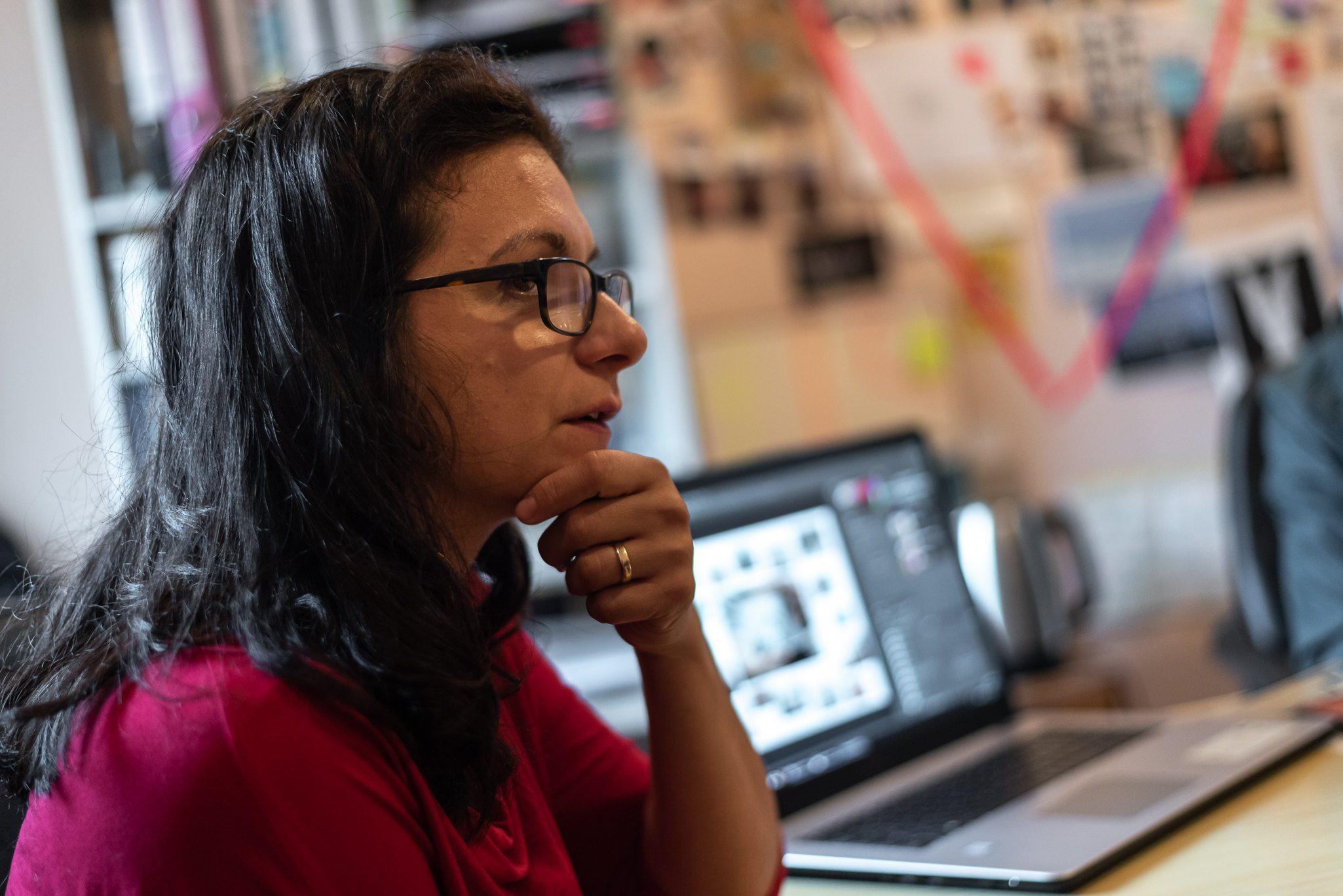
Berta: How much time are you going to spend on the next visit?
Odeta: So, now we are staying for 12 days, and the same in June. It is about the same period, we come after the rehearsals or after the departure to Cēsis, where the performance is on the 29thof June, and we might leave on the 1stof July but the tickets have not been bought yet, so I cannot say precisely but more or less it’s the same number of days between 10–14 days, we were thinking.
Berta: Is there something else you want to add?
Odeta: Well, thank you. I would really like to thank MagiC Carpets for this experience. They made it very easy to accomplish it, to make it, to put this project together. It’s very nice to know that this sort of projects exist, where artistic people can come together and it doesn’t need to be strenuous financial effort and all the logistics are taken care of. For this I am very grateful to MagiC Carpets and to local people, to Sandra.
